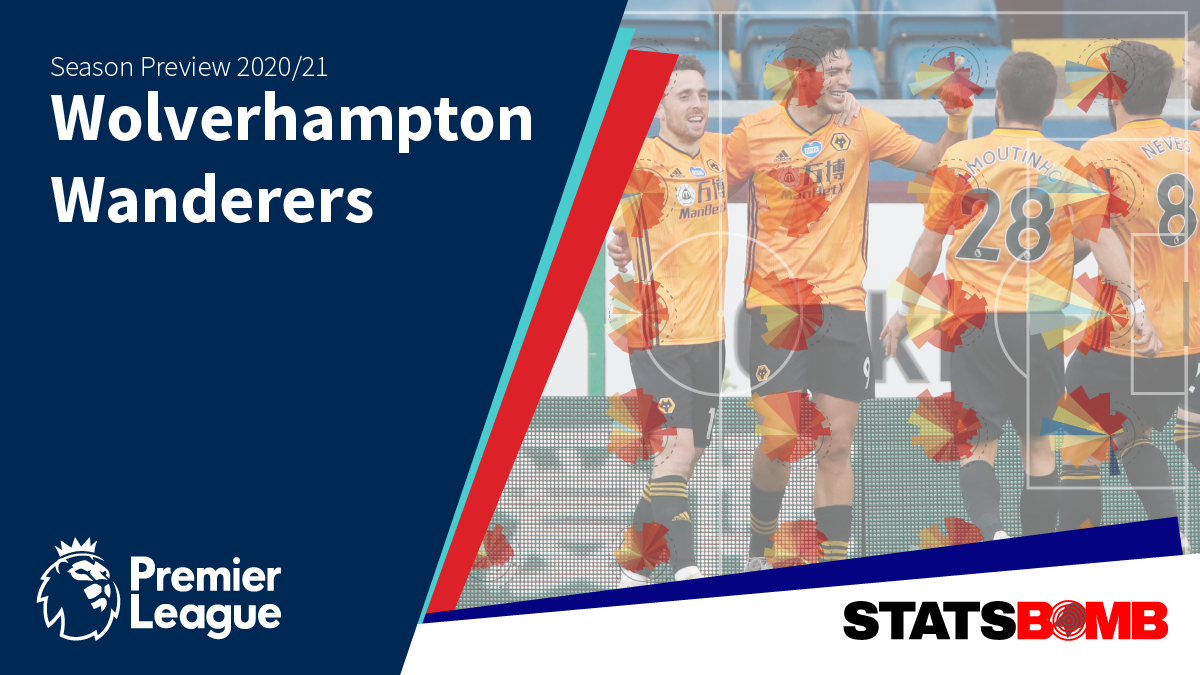Wolves, or to give them their full name "Little Portugal", have very quickly become a Premier League club that can match up against any team in the league. Across two seasons, they have proven to be consistent, resilient and well worth their consecutive seventh placed finishes. Of course, like many teams outside the television big six, Wolves harbour ambitions of more than that, and may be slightly frustrated that they couldn't exploit the down years for both Tottenham and Arsenal and do what Leicester did in 2019-20 and finish higher up. At least in part this inability to broach the gap upwards can be attributed to a slightly slow start. Wolves had a 2-7-2 record after a 1-1 draw at Arsenal on 2nd November, and while there were good results in there, including a 2-0 win against Manchester City and draws against Manchester United and Leicester City, it's likely that this period was that which impacted the final table most. Was there a problem? Not really? Metrics weren't at their strongest during this period as we can see from Wolves' two season expected goal trends, but there was good reason: 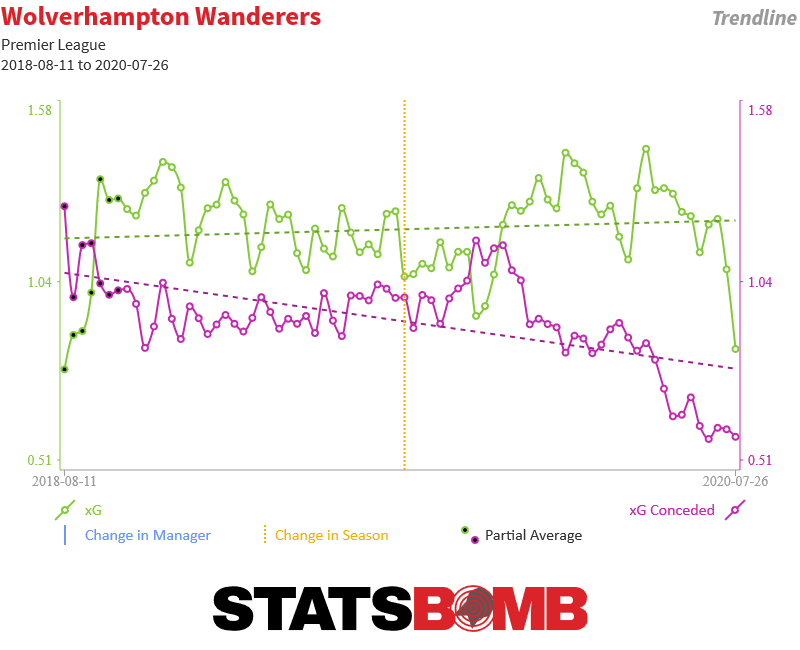 Belfast, Yerevan, Turin, Istanbul and Bratislava formed a Europa League tour for the club during a period in which they played as many non-league fixtures as league (eleven each). With a relatively small squad and a fairly consistent first team, it's actually to the team's credit that they got through that opening period of the Premier League without further decline. The big story in the chart above is the defence. In the back half of 2019-20 Wolves gave up under one non-penalty expected goal in a game fourteen times. In eight of those games they allowed under 0.5. Wolves post-lockdown defence was structurally the best in the league. Wolves have achieved this defensive stability by being one of the most clear-eyed tactical teams in the division, and a world away from the hard pressing espoused by other managers. That Nuno Espirito Santo is both Portuguese and a former goalkeeper for Jose Mourinho is highly indicative of Wolves style of play:
Belfast, Yerevan, Turin, Istanbul and Bratislava formed a Europa League tour for the club during a period in which they played as many non-league fixtures as league (eleven each). With a relatively small squad and a fairly consistent first team, it's actually to the team's credit that they got through that opening period of the Premier League without further decline. The big story in the chart above is the defence. In the back half of 2019-20 Wolves gave up under one non-penalty expected goal in a game fourteen times. In eight of those games they allowed under 0.5. Wolves post-lockdown defence was structurally the best in the league. Wolves have achieved this defensive stability by being one of the most clear-eyed tactical teams in the division, and a world away from the hard pressing espoused by other managers. That Nuno Espirito Santo is both Portuguese and a former goalkeeper for Jose Mourinho is highly indicative of Wolves style of play: 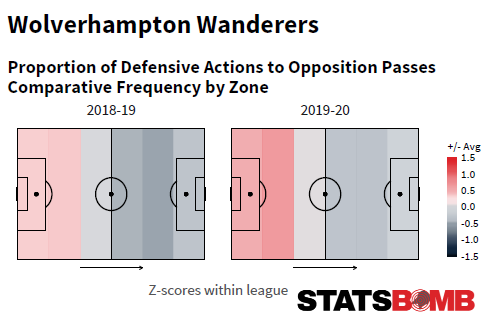 Nuno's set-ups are well established at this stage. Sixteen teams used three centre backs at some point last season [t's funny how these fashions pervade] yet only two of them set up with three centre backs in every game, Wolves and Sheffield United. The core of this team is well established too but will undergo some kind of remedial work going forward thanks to the absence of two key parts: the full backs. Stalwart Matt Doherty has joined Tottenham while Jonny has sustained a long term ACL injury and is likely to be unsighted for many months. In 2018-19, Wolves fielded 14 players for over 900 minutes in the league and in 2019-20 it was 13. They have operated with a very small consistent squad for two full seasons and are now obliged to adapt especially on the flanks. On the left Ruben Vinagre may have felt he was stepping out of the reserve slot he's held for two seasons but the signing of 31 year old Lyon rotational full back Marçal suggests his role may well persist for now. In the interests of sample size, this visualisation covers three seasons; he's experienced and was playing in the Champions League three weeks ago, but he will need to show robustness and reliability as being a Wolves full back is not a position for the underinvolved.
Nuno's set-ups are well established at this stage. Sixteen teams used three centre backs at some point last season [t's funny how these fashions pervade] yet only two of them set up with three centre backs in every game, Wolves and Sheffield United. The core of this team is well established too but will undergo some kind of remedial work going forward thanks to the absence of two key parts: the full backs. Stalwart Matt Doherty has joined Tottenham while Jonny has sustained a long term ACL injury and is likely to be unsighted for many months. In 2018-19, Wolves fielded 14 players for over 900 minutes in the league and in 2019-20 it was 13. They have operated with a very small consistent squad for two full seasons and are now obliged to adapt especially on the flanks. On the left Ruben Vinagre may have felt he was stepping out of the reserve slot he's held for two seasons but the signing of 31 year old Lyon rotational full back Marçal suggests his role may well persist for now. In the interests of sample size, this visualisation covers three seasons; he's experienced and was playing in the Champions League three weeks ago, but he will need to show robustness and reliability as being a Wolves full back is not a position for the underinvolved. 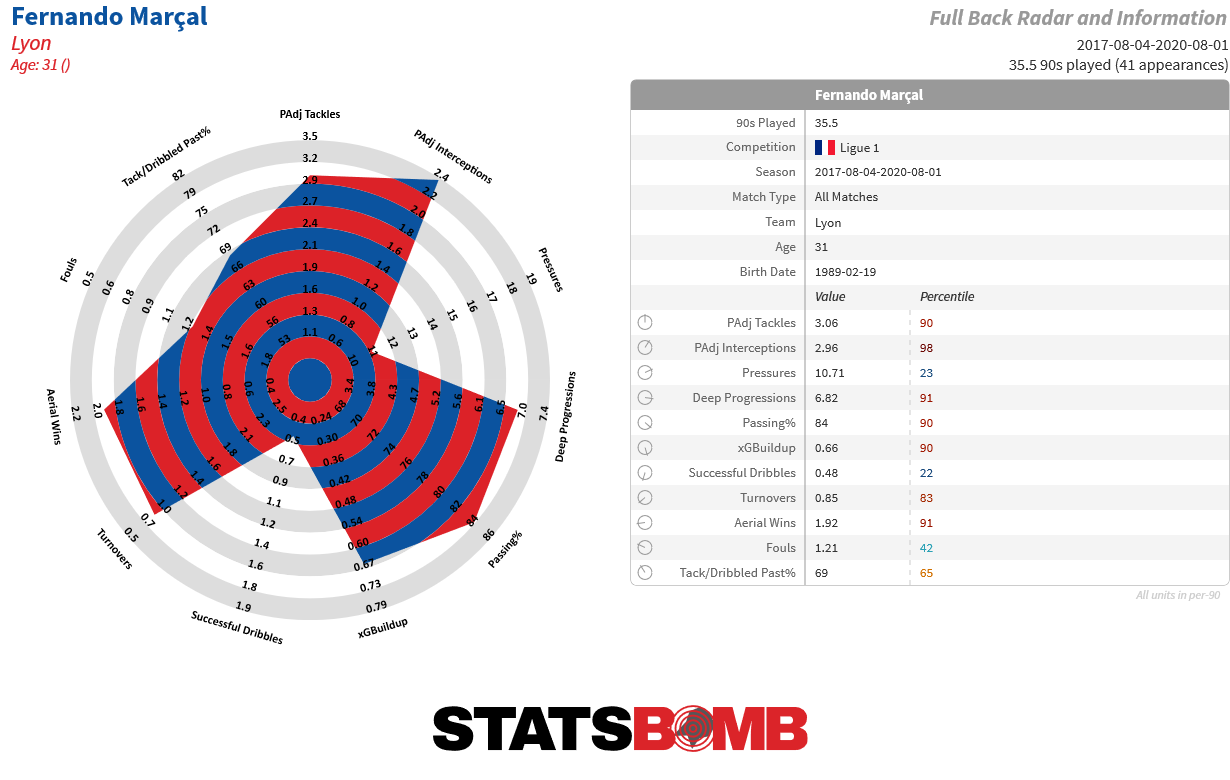 Never knowingly under-involved is Adama Traoré and the early word is that he may end up covering Doherty's role, at least to start the season. He's well capable of playing this position and anywhere else on the right flank and persists in being a unique and curious player. Last season saw a further rise to prominence outside niche stats fans fawning over his dribble volumes. Firstly, his four league goals were spread across three league games, Manchester City home and away and Tottenham. No better way to attract attention than scoring key goals in big games. However, more encouragingly, we saw further end production in his creative numbers. Nine assists was big-boy output and not wildly ahead of expectation. All in all for players with a decent volume of minutes (say 1500+) he was top ten in the league for open play key passes (1.6 per 90) and resulting xG Assisted (0.21 per 90). The reliability of how he made those goals was hugely positive. When you have a thing and you can keep doing your thing and nobody can stop you doing your thing, then you've really got something! But if it doesn't result in goals, your thing might not be that useful. Traoré's thing used to be facing up a defender and then killing them for strength and pace to make space for a further pass. However, the further pass wasn't necessarily a thing too. Now he's showing in the Premier League that goal creation is his thing. Beat a man on the flank and find an attacker in the box. For the defender it's nightmarish: they know what is coming but not if they can stop it. He's probably stronger than you and even if he isn't he sure looks like he is. Check out his very specific chance creation here, and how all his assists have a common thread:
Never knowingly under-involved is Adama Traoré and the early word is that he may end up covering Doherty's role, at least to start the season. He's well capable of playing this position and anywhere else on the right flank and persists in being a unique and curious player. Last season saw a further rise to prominence outside niche stats fans fawning over his dribble volumes. Firstly, his four league goals were spread across three league games, Manchester City home and away and Tottenham. No better way to attract attention than scoring key goals in big games. However, more encouragingly, we saw further end production in his creative numbers. Nine assists was big-boy output and not wildly ahead of expectation. All in all for players with a decent volume of minutes (say 1500+) he was top ten in the league for open play key passes (1.6 per 90) and resulting xG Assisted (0.21 per 90). The reliability of how he made those goals was hugely positive. When you have a thing and you can keep doing your thing and nobody can stop you doing your thing, then you've really got something! But if it doesn't result in goals, your thing might not be that useful. Traoré's thing used to be facing up a defender and then killing them for strength and pace to make space for a further pass. However, the further pass wasn't necessarily a thing too. Now he's showing in the Premier League that goal creation is his thing. Beat a man on the flank and find an attacker in the box. For the defender it's nightmarish: they know what is coming but not if they can stop it. He's probably stronger than you and even if he isn't he sure looks like he is. Check out his very specific chance creation here, and how all his assists have a common thread: 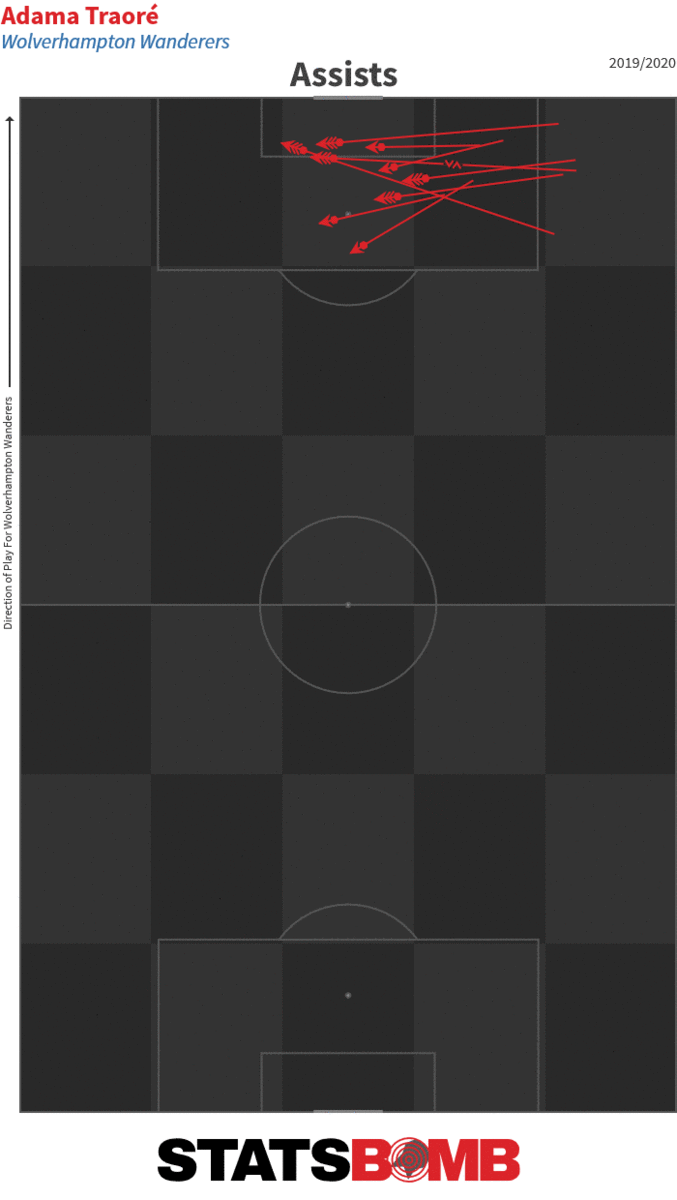 Part of the Wolves oeuvre is ball carrying at pace. It's not just Traoré either. Some experimental numbers I generated for speed with directness of ball carrying saw Diogo Jota rank fastest in the league, with Raúl Jiménez ranking fairly high too. Ironically, Traoré ranked a way back for this specific measure, which was likely a function of his tendency to stand up to the defender and essentially stalling before moving, but he ranked top in the league for average distance per carry into or inside the final third, with Jota third. Wolves as a whole attempt more actual dribbles (~take-ons) than any other team in the league, and carry the ball for longer distances everywhere high up the pitch right up into the box. This is a team that relies strongly on attackers that can transition through zones with the ball at their feet, as we can see when we look at longer carries for those three players:
Part of the Wolves oeuvre is ball carrying at pace. It's not just Traoré either. Some experimental numbers I generated for speed with directness of ball carrying saw Diogo Jota rank fastest in the league, with Raúl Jiménez ranking fairly high too. Ironically, Traoré ranked a way back for this specific measure, which was likely a function of his tendency to stand up to the defender and essentially stalling before moving, but he ranked top in the league for average distance per carry into or inside the final third, with Jota third. Wolves as a whole attempt more actual dribbles (~take-ons) than any other team in the league, and carry the ball for longer distances everywhere high up the pitch right up into the box. This is a team that relies strongly on attackers that can transition through zones with the ball at their feet, as we can see when we look at longer carries for those three players: 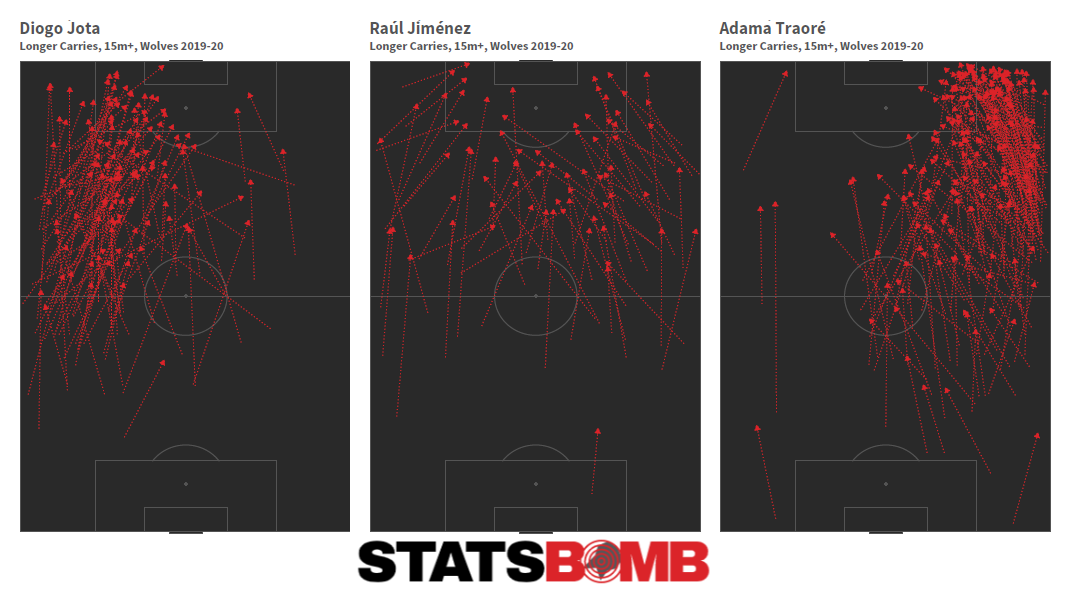 Elsewhere it's intriguing to know whether the club has secured the future of the Portuguese national team in Vitinha and Fábio Silva or attached around £60m to pure potential that will not pay off for some seasons. Each significantly lacks experience of good quality men's level football and thus eludes anything but the most scant review in data. Vitinha at 20 years old has played over 1000 minutes in the Portuguese second tier and grabbed fleeting substitute minutes in the second half of Porto's season, while Silva at just 18 years old had a similar profile in Porto's first team with time on the pitch minimal and mainly via the bench. The impact each can make is difficult to know, and it seems hard to envisage that either will quickly shift the established first teamers out, but they do bring much needed depth to the squad in general and it will be hoped that they can settle and contribute quickly. Projection In a compressed season with very little room for recovery, Wolves will probably reflect that a lack of European football is a real boost to their Premier League chances. Pre-season points projections concur with their seventh placed finishes and expect another season in the nominal "best of the rest" slot. Nuno's style has kept Wolves hard to beat, but there were almost as many draws as wins last season and a shade more attacking power might be the recipe for really pointing upwards and shaking up the top six mix. With a smaller squad and specific and key contributors, injury luck will always have an impact. With that, Wolves are as reliable as they come, and the range of outcomes for this team is likely a lot smaller than that of certain others eyeing similar positions in the table such as Leicester, Tottenham, Arsenal or Everton. It's a good time to be a Wolves fan, and should continue to be so.
Elsewhere it's intriguing to know whether the club has secured the future of the Portuguese national team in Vitinha and Fábio Silva or attached around £60m to pure potential that will not pay off for some seasons. Each significantly lacks experience of good quality men's level football and thus eludes anything but the most scant review in data. Vitinha at 20 years old has played over 1000 minutes in the Portuguese second tier and grabbed fleeting substitute minutes in the second half of Porto's season, while Silva at just 18 years old had a similar profile in Porto's first team with time on the pitch minimal and mainly via the bench. The impact each can make is difficult to know, and it seems hard to envisage that either will quickly shift the established first teamers out, but they do bring much needed depth to the squad in general and it will be hoped that they can settle and contribute quickly. Projection In a compressed season with very little room for recovery, Wolves will probably reflect that a lack of European football is a real boost to their Premier League chances. Pre-season points projections concur with their seventh placed finishes and expect another season in the nominal "best of the rest" slot. Nuno's style has kept Wolves hard to beat, but there were almost as many draws as wins last season and a shade more attacking power might be the recipe for really pointing upwards and shaking up the top six mix. With a smaller squad and specific and key contributors, injury luck will always have an impact. With that, Wolves are as reliable as they come, and the range of outcomes for this team is likely a lot smaller than that of certain others eyeing similar positions in the table such as Leicester, Tottenham, Arsenal or Everton. It's a good time to be a Wolves fan, and should continue to be so.
If you're a club, media or gambling entity and want to know more about what StatsBomb can do for you, please contact us at Sales@StatsBomb.com We also provide education in this area, so if this taste of football analytics sparked interest, check out our Introduction to Football Analytics course Follow us on twitter in English and Spanish and also on LinkedIn
